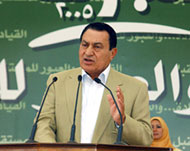Rights body: Egypt poll to be unfair
Egypt’s leading non-governmental rights group has said it does not expect the country’s first multi-candidate presidential vote to be fair, Aljazeera and agencies report.

Highlighting an inadequate independent supervision and a lack of transparency on Monday, the concerns of the Egyptian Organisation for Human Rights (EOHR) echo criticism by other groups.
EOHR blasted the make-up of the election oversight committee and its decision to bar access to polling stations for independent observers.
“I don’t expect we will reach a fair or true result because steps until now by the [election] committee have shown a lot of arbitrariness and a lack of transparency,” EOHR secretary-general Hafez Abu Seada said.
Meanwhile, Aljazeera’s correspondent in Cairo learned from judicial sources that the election oversight committee decided to exclude 1700 judges from observing the presidential election on the grounds that they had not submitted their names in the lists issued.
The sources said the excluded judges had adopted anti-government positions, particularly during a meeting of the former general assembly of the Judges Club.
Among those excluded are 531 administrative judges from the state council and 1100 from civil courts, the sources said.
In power for 24 years, 77-year-old President Hosni Mubarak is widely expected to win the 7 September election against nine other contestants.
Requests ignored
EOHR and other rights groups want to monitor the poll to ensure there is no repeat of the violence and reports of harassment that marred the 2000 parliamentary elections which Mubarak’s National Democratic Party (NDP) won.
But they complain that the committee has ignored their requests.
 |
|
President Mubarak is widely |
The election oversight committee says only judges and candidates’ representatives will be allowed in polling stations.
The government says it sees no need for foreign monitors.
In a separate incident on Monday, journalists of al-Shaab staged a rally in front of the Higher Press Council in protest against the continued ban on the newspaper despite 14 court rulings approving resumption of its publication, Aljazeera learned.
The journalists demanded removal of the ban and reimbursement of their salaries, frozen for the past five years.
US view
In Washington, State Department spokesman Sean McCormack called on Egypt to rethink its rejection of foreign monitors.
“We urge the Egyptian government to allow in election monitors, election observers,” he said.
“This is not a comment on any particular government or the state of their democracy. It is something that is commonly done,” McCormack added.
Although EOHR and other groups want judges to monitor the election, they say the state’s definition includes low-ranking judiciary employees, who may be unable to challenge abuses.
Election day strategy
EOHR has trained about 600 monitors and planned to train more, Abu Seada said. They would watch for abuses outside polling stations and could at least enter to vote, which would give them a chance to check for signs of malpractice, he added.
“It is not possible to describe any elections as democratic or impartial without an observer presence,” EOHR said in a report about the election process so far.
Other groups have announced similar monitoring plans.
Campaign bias?
The 23-page report made observations from the campaign which began on 17 August. It said state television had been relatively neutral in its coverage but accused the state press of supporting Mubarak despite instructions to be neutral.
“The national newspapers have been conscripted for daily propaganda for the candidate of the ruling National Democratic Party,” it said.
It cited examples where Al-Ahram, the leading state paper, virtually dedicated its front page to Mubarak while rivals received a line or were only covered in the inside pages.
Osama Soraya, Al-Ahram’s editor-in-chief, denies bias. He said Mubarak’s campaign generated more news than his rivals.
A separate group of 10 non-governmental organisations, in a report issued on Monday, also said the state press was biased in favour of Mubarak, with Al-Ahram as the worst offender.